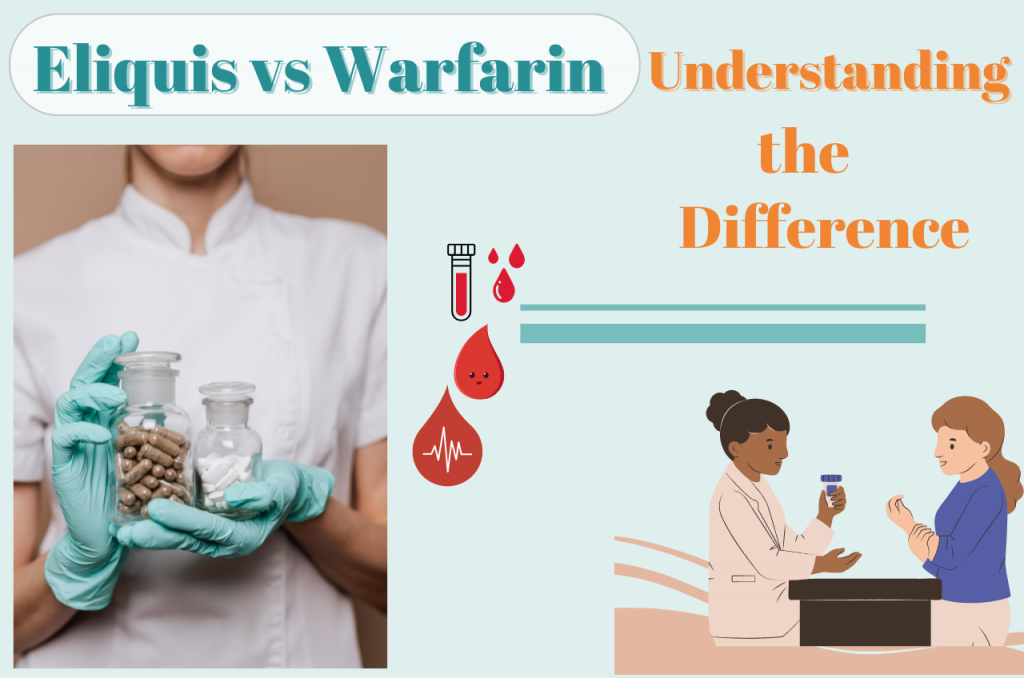Introduction: Why Compare Eliquis vs Warfarin Anticoagulants are essential for treating atrial fibrillation (AFib) and deep vein thrombosis (DVT), which raise the risk of blood clots.
An irregular heartbeat, or AFib, raises the possibility of blood clots developing in the heart. A stroke may result from these clots moving to the brain. To lower this risk, anticoagulants are essential. A blood clot in a deep vein, typically in the legs, causes DVT.
If the clot spreads to the lungs, it may result in a potentially lethal pulmonary embolism (PE). Anticoagulants stop clots from getting worse and from coming back.
Warfarin and Eliquis (apixaban) are two anticoagulants that are frequently prescribed. Although they both have the same basic function of avoiding blood clots, their processes, applications, and practical effects on patients are very different.
Some patients may benefit more from one over the other due to variations in cost, convenience, and safety. Here are a few main distinctions between these drugs, which are discussed below.
How Eliquis and Warfarin Work
By specifically preventing the body from producing clotting factors, warfarin disrupts the body’s normal blood clotting system. Vitamin K epoxide reductase is inhibited by warfarin. Warfarin slows down the synthesis of these clotting factors by decreasing the availability of active vitamin K, which lessens the blood’s capacity to clot.
Eliquis is a member of a more recent class of anticoagulants known as non-vitamin K oral anticoagulants (NOACs) or direct oral anticoagulants (DOACs). Eliquis functions by directly blocking the enzyme Factor Xa. Prothrombin must be changed into thrombin by factor Xa in order for fibrin, the protein threads that hold blood clots together, to develop.
Eliquis efficiently reduces the production of clots by stopping this chain reaction by blocking Factor Xa.
Eliquis provides a faster therapeutic impact than Warfarin because it starts to function within hours after consumption. One of the reasons Eliquis does not need bridging therapy when beginning treatment is because of this prompt activity.
Therefore, Warfarin and Eliquis both interfere with the coagulation cascade, although in distinct ways:
- Warfarin decreases active vitamin K, which lowers the upstream synthesis of clotting components.
- Eliquis targets Factor Xa directly, acting downstream and bringing the formation of a clot one step closer.
These medications give medical professionals options in treating a range of patient demands by focusing on distinct locations along the clotting pathway.
Effectiveness in Preventing Blood Clots:
Warfarin and Eliquis both work well to prevent blood clots; however, how well they work depends on the specific situation. Warfarin is still necessary for some patient groups; however, Eliquis is frequently chosen due to its ease of use, predictable action, and decreased risk of bleeding.
For many years, warfarin has been a mainstay of anticoagulation treatment and is still a dependable choice for many patients. When compared to no treatment, warfarin lowers the incidence of stroke in patients with AFib by almost 64%.
When taken as prescribed, warfarin effectively prevents blood clots from recurring.
The maintenance of an ideal therapeutic range is essential to warfarin’s efficacy. Inadequate care may result in bleeding or a higher risk of clotting.
Dietary restrictions and routine blood monitoring can affect compliance, which could lower its overall efficacy.
What food to avoid while taking Eliquis and Warfarin
Eliquis does not interact with vitamin K like Warfarin does. But some food and beverage restrictions should still be followed:
- Eliquis’s blood levels may rise as a result of grapefruit’s interference with the enzymes that break it down. Bleeding is more likely as a result.
- Drinking too much alcohol can make bleeding more likely.
- Diets high in sodium have the potential to exacerbate illnesses such as hypertension, which raises the risk of stroke and other cardiovascular incidents.
- Steer clear of herbal supplements without a doctor’s approval, as this may result in bleeding or lessen their efficacy.
- Steer clear of acidic and spicy foods (such as citrus fruits and tomato-based items).
- To promote general health, stay hydrated and eat a nutritious, well-balanced diet.
Cost Comparison: Is Eliquis Worth the Higher Price?
Anticoagulants like Warfarin and Eliquis (apixaban) are frequently recommended to treat disorders like atrial fibrillation (AFib) or to avoid deep vein thrombosis (DVT) and pulmonary embolism (PE). Although both drugs work well to prevent blood clots, they are very different in price.
Eliquis, a more recent direct oral anticoagulant (DOAC), is usually more expensive than Warfarin, a generic drug that is more reasonably priced. Is Eliquis, however, worth the additional expense? Let’s investigate. cost of eliquis vs. Warfarin.
Warfarin is among the least expensive anticoagulants on the market because it is a generic medication and is readily available. Without insurance, a month’s supply can cost as little as $5 to $15 depending on its strength, dosage quantity, and other factors.
Whereas Eliquis is a well-known brand of prescribed medication that belongs to a more recent class of anticoagulants. Depending on the dose, a month’s supply might cost anywhere between $500 and $600 at retail based on your local medication dispensing vendor. With some copays and discount coupons on insurance coverage, Eliquis’s price may go down with insurance, but they usually still surpass those of Warfarin. Looking for the most convenient and affordable way to manage your prescription needs?
Buy Eliquis online from our trusted platform, LifeRx Pharmacy, offering competitive prices and reliable delivery. As the cheapest place to buy Eliquis, we prioritize affordability without compromising authenticity.
For many patients, Eliquis’s significant benefits over Warfarin may outweigh its greater price.
- Warfarin needs regular blood tests to guarantee the right dosage and prevent problems. Frequent monitoring may result in additional expenses and annoyance.
- Eliquis eliminates the need for regular blood monitoring, increasing convenience and lowering further medical costs.
- Warfarin The effectiveness of the drug may be impacted by abrupt dietary changes; thus, patients must carefully monitor their vitamin K consumption.
- Eliquis has no dietary limitations, so eating habits can be more freely chosen. In patients with AFib, Eliquis has been demonstrated to be more effective than Warfarin in lowering the risk of stroke and bleeding problems.
- Warfarin needs careful dosage changes due to its varied effects and delayed onset, whereas Eliquis has rapid action and reliable therapeutic results
Conclusion: Which Option is Right for You?
Although Eliquis costs more than Warfarin, many patients may find it to be a good investment due to its advantages, which include decreased bleeding risk, convenience, and consistent efficacy. Affordability is still a crucial consideration, though, and Warfarin is still a dependable and affordable choice for people who can handle its requirements.
In the end, you should discuss your medical history, lifestyle, and financial situation with your healthcare practitioner before making the choice.
FAQ
Which medication is more effective at preventing blood clots?
Eliquis lowers the risk of stroke and systemic embolism while also lowering the risk of significant bleeding, making it generally more effective than Warfarin at avoiding blood clots, especially in patients with atrial fibrillation.
Is Warfarin still a good option for blood thinning?
Indeed, Warfarin remains a viable option for blood thinning, particularly for individuals who cannot afford more recent drugs like Eliquis or who have mechanical heart valves or specific clotting abnormalities. When properly monitored, it continues to work effectively.
Can I switch Warfarin to Eliquis?
Yes, you can move from Warfarin to Eliquis, but to guarantee a smooth and safe transition, you should do it under your doctor’s supervision.
Can I take Eliquis or Warfarin during pregnancy?
No, taking Warfarin or Eliquis while pregnant is not advised. Birth malformations can be caused by warfarin, and Eliquis is not advised because of its poor safety record. During pregnancy, other blood thinners, such as heparin, are commonly utilized. Consult your physician regularly.
Are there cheaper alternatives to Eliquis?
Indeed, there are less expensive alternatives to Eliquis, including generic Warfarin and other direct oral anticoagulants (DOACs), such as Dabigatran (Pradaxa) and Rivaroxaban (Xarelto), which may be less expensive depending on insurance and discount plans.
For more informative blogs, click here


